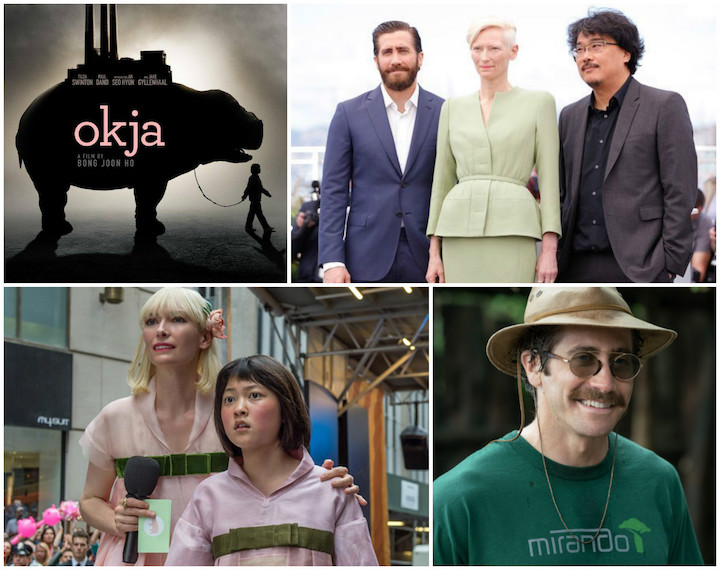|
From:TheBahamasWeekly.com Entertainment
Cannes, France ---- Okja (pronounced Oke Cha) is one of two Netflix films competing for the Palm d’Or prize at the 70th Cannes Film Festival (the other film is The Meyerowitz Stories). With its big, clunky, and clumsy debut this morning, Okja has something boisterous to say about the future of the movie business around the world. Yes, that means Hollywood, Bollywood, Nollywood and every other kind of Wood. That might even mean Cariwood (which is a term coined for the Caribbean Film Industry). As expected on this third day of the festival, when the Netflix Logo appeared on the screen at the world famous Lumiere (named after the Lumiere Brothers - the inventors of the cinema no less) Theater this morning, there was a collective jeering “boooo.” What was not expected was the technical snafu of Okja’s aspect ratio. Basically, it was projected incorrectly on the screen. As a result of the malfunction, the projectionist at the Lumiere had to stop the film fifteen minutes in and start all over again. Some saw this as a sign from the cinema gods at the atrocity of Netflix being on the holy grounds of the Auditorium Lumiere. Some even saw it as a secret conspiracy to sabotage Netflix’s debut at Cannes. In the end, much of the “boos” were replaced with applause from the audience. Then it almost felt like a shift occurred; an unspoken announcement that Netflix is in the house, and they are here to stay. It is a new day in the world of cinema, people. You’re reading a bit of a memo. It’s a new day because I believe we’re seeing a new type of Hollywood. What do I mean by that? I have been posting on my Instagram account (@travoltacooper), daily chronicling Cannes. On my first day here, a follower commented on a post asking me ‘why are there no Hollywood Studio films at Cannes this year?’ Although I knew it had something to do with a creative direction and programming message being beamed into the movie universe on the state of cinema, I wasn’t quite sure what that message was. So I told him to check back for an answer in a few days. Then I saw Okja, which Netflix produced for a whopping fifty (50) million dollars, and the message became crystal clear. Okja looks, feels, and breathes like a Hollywood film. It has Hollywood stars and a Hollywood production value, but it’s not a “Hollywood” movie produced by a major studio in Los Angeles, and that’s the message. Cannes is shaking up all things: creating a grey area where there used to be black and white (via the “Hollywood Film versus Independent Film” debate). The truth is, as Hollywood Studios created more and more subsidiary companies like Fox Searchlight, Sony Classics, or A24 (A24 which won Best Picture this year with Moonlight), it has been hard to pinpoint what “independent” even means anymore. Hollywood did this to coopt and eventually control the movement of independent cinema. With Okja the word “independent” has become somewhat clear again. How? In the words of Okja’s director Bong Joon Ho, he said of Netflix “They gave me total freedom.” Todd Haynes said the same of Amazon Studios (explained in yesterday’s article). Independence simply means creative control despite budgets and costs. We all know even smaller less costly “independent movies” aren’t often given this privilege any more.
Bong Joon Ho is a South Korean filmmaking phenomenon. His previous films The Host and Snowpiercer have earned both rave reviews and healthy box office numbers. Okja is his biggest and most ambitious gamble yet, and by the reaction this morning, it looks like it is destined to pay off. Okja, which debuts worldwide via Netflix on June 28th (and is scheduled for a wide big-screen parallel run in South Korea, along limited run in the U.S. and U.K.) was shot in two languages and in three countries (South Korea, the U.S. and Canada). It tells the story of Mija (newcomer An Seo Hyun, who’s outstanding), a 13-year-old orphaned girl living with her grandfather in a mountainous farm country in South Korea. Her only friend is Okja, a cuddly six-ton "super piglet" from a genetically modified new species that seemingly combines elements of hippopotamus, pig and devoted pet pooch. As with most coming of age adventures, Mija's blissful adolescent worldview is cruelly disrupted when Okja is suddenly hauled away to New York by her creator, corporate CEO Lucy Mirando (Tilda Swinton), who is seeking to erase her company's dubious track record with eco-friendly, feed-the-world, ethical-capitalist publicity stunts. Inevitably, Mirando's real plans for Okja turn out to be far more sinister. With a childlike burning sense of injustice, Mija refuses to take the loss of Okja sitting down so she embarks on an audacious mission to rescue her beloved beast and bring her home. Mija joins forces with a gang of dapper but ethically conflicted animal welfare activists led by Jay (Paul Dano) and K (Steve Yeun). Along with Paul and Steve, Hollywood actor Jake Gyllenhaal also has role in the film as Dr. Johnny Wilcox, a celebrity TV vet who is hired by Mirando to parade Okja before he is inevitably eaten. While Okja certainly has a mild “meat is murder” message and a message about nature and our surrounding environment, it packs a bigger message at this festival. It silently says that this is a cultural moment in all of moviedom. The cultural architects of the cinema are shifting things. I’m almost reminded of Luke Skywalker and his line about “the force” in the new Star Wars trailer where he suggests that the there is more than just the “dark side” or “light side.” “There is so much more,” he says. More? Like what? A “grey side”? After seeing Okja on the biggest screen, it is no doubt a movie for the big screen. But instead, it will open streamed on computers, iPads, and cell phones (if you do see it this way, try and get or connect it to the biggest screen possible). Upon leaving the screening, comparisons of it were being made to Hollywood kingpin Steven Spielberg’s E.T. and The B.F.G (also Roald Dahl comparisons). That might symbolize a new type of Hollywood where resources and creative independence determines what a “Hollywood” establishment type film is. We’re in the age of digital distribution: corporate distribution, self-distribution, and otherwise. Whether the film opens and is watched in a theater, or home, won’t matter whether or not it qualifies for the biggest awards. Academy Awards, there's your memo. Whichever direction Cannes is steering this ship, Hollywood, new and old, is sure to follow. Day One coverage: The Cinemas is the brainchild of its host, Bahamian writer, director, and producer Travolta Cooper, who began the show as a result of an endorsement deal with The Bahamas’ movie theater chain. At heart, The Cinemas is designed to promote and encourage the new wave of Caribbean Cinema happening in the Region and around the world. The show consists of movie reviews and interviews with a Caribbean twist.
|

